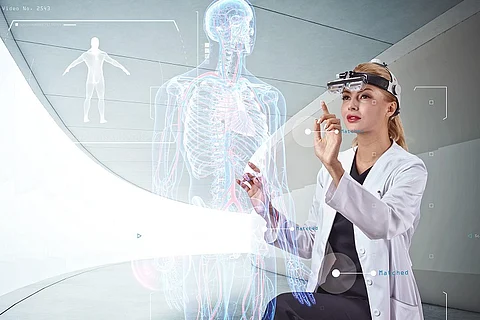

For a medical device manufacturer, launching an Imaging or Diagnostic device is an expensive affair given costs of shipping the device to a location. As a result, the return on investment from product launch events becomes a major challenge for marketing managers.
Corporates spend millions of dollars in marketing, selling, training and servicing their products. But with emerging technologies such as virtual reality and augmented reality, what if the experiences could be created to try the product virtually and understand every nitty gritty of the device without it being physically present? That’s what Hyderabad-based startup Nexrea does.
Founded in June 2017 by Ramya Gujjula and Priyanka Gujjula, Nexrea crafts virtual experiences for marketing, selling, training or servicing of any tangible product using a proprietary AR/VR technology that it has built.
“For example, if a company such as GE healthcare wants to train their internal staff or their customers, they usually spend a lot in travel, transporting the device, and getting people together. Using our solution, they save about 50% of the training costs, which are currently as high as a few crores,” Ramya says.
They have built MEDREA, a proprietary Augmented Reality Platform that offers tailor-made solutions for companies. This app uses immersive, 3D interactive learning solutions and high-fidelity synthetic virtual environments that create realistic, detailed, and engaging learning solutions. Currently, MEDREA caters to the Healthcare industry.
NexRea’s Augmented Reality app has features that enable a salesperson to track and analyse the data of each prospect, which the company claims saves clients’ time and money, by sharing their device virtually with their sales personnel and customers anytime, anywhere.
“With this app, your customers are free to play with the device without any hassles and within the comfort of their geographical location. By providing training in a virtual environment, you can avoid any kind of expensive downtime or disruption to your normal operations, in addition to saving on travel costs,” Ramya says.
And not just for sales and marketing, its solutions also help clients service diagnostic devices remotely. The app provides step by step instructions on installing, maintaining, repairing and supporting a range of medical devices remotely. It also allows for real-time collaboration between remote experts and field technicians, thus avoiding expensive field visits.
Team of Nexrea
It is also working in the education space where it creates gamifying experiences for students.
For the healthcare industry, it works with large companies such as GE Healthcare, Johnson & Johnson, Sysmex, CYIENT and earns a revenue on a per project basis.
In the education space, it works on a B2B2C model where it sells virtual experiences and games to educational institutes, who in turn sell them to students on a subscription basis. Nexrea gets a part of the subscription fee that institutes charge students. For this segment, it is working with institutes such as Stanford University and BicRens.
A bootstrapped startup, Nexrea has turned profitable, thanks to revenue from its clients. It currently has two offices – one based out of T-Hub in Hyderabad and the other in San Francisco, USA.
After growing its business in the healthcare and education space, Nexrea’s next area of focus will be the retail industry. “We’ve already made enough strides to get there. We’ve been selected for the coveted Korean Startup Accelerator Program organised by the Korean Government to gain access to the Asian markets. K-Startup Grand Challenge will gain us access to the retail leaders such as Samsung, LG, Hyundai etc.,” says Ramya.
It is also looking at Retail, Tourism, Defence and Industrial Manufacturing as other potential industries.
Parallelly, it is also investing in building up technology convergence - where Augmented Reality, Virtual Reality, Mixed Reality, Artificial Intelligence and 3D Printing meet, to create valuable applications and experiences.
AR, VR, AI being emerging technologies, the scope still remains large, according to Ramya. “The ability to thrive in such an evolutionary environment while building on effective use cases will only make us leaders in this space and that’s our long-term goal,” she adds.